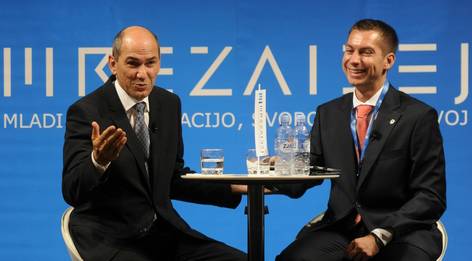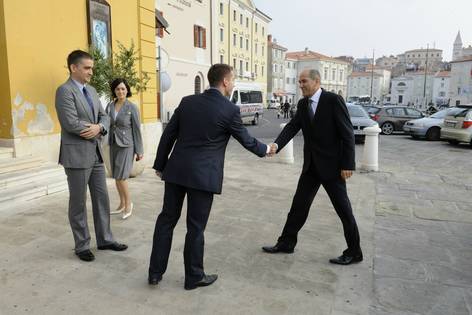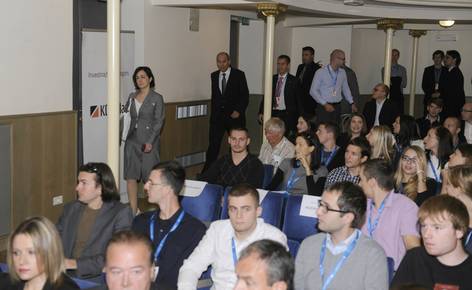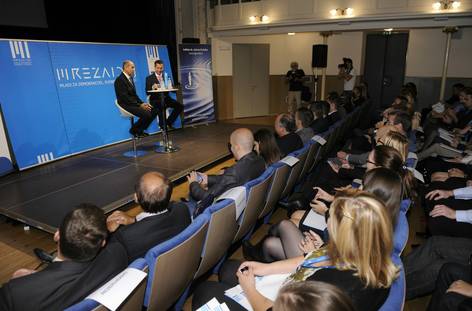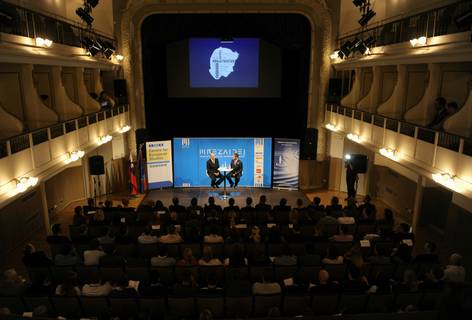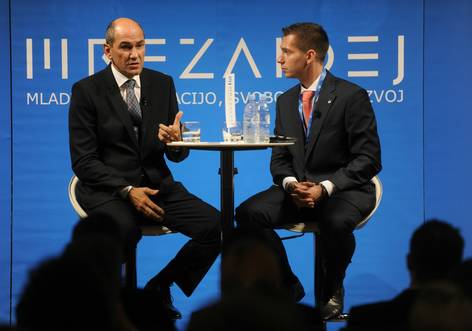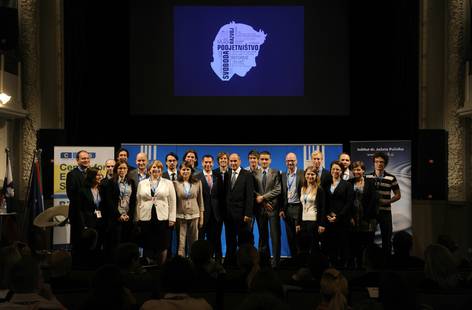NEWS
Prime Minister Janša's message to Youth: "Be louder."
Today, in the hall full of young entrepreneurs and students, the Prime Minister of the Republic of Slovenia, Janez Janša, and the leader of the youth initiative "Ideas Network", Mark Boris Andrijanič, discussed the ideological foundations of the independent Slovenian state, measures currently being adopted and the future of Slovenia's development, the last arousing the most interest in today's audience. The Prime Minister pointed out that the Slovenian Government is adopting the most difficult measures in history and is devoting considerable effort to the social dialogue, so as to achieve the widest possible consent for the stabilisation of the situation in Slovenia. The Prime Minister called upon young people to raise their voice in these decisive times and to defend their rights, as with the proposed changes the Government strives to protect them and prevent the young generation from paying today's debts their entire lives.
The first part of the talk focused on the formation of the independent state. Prime Minister Janša said that his greatest role model is still Jože Pučnik, whose thoughts on democracy and building a state are still alive today. "This is a man devoted to the thing," the Prime Minister quoted Drago Jančar. He recalled the times of the Demos Government, the first Slovenian Government, which had to do everything and develop all the necessary legislation for the establishment of the independent state in six months with considerably less means and people. "Today the state apparatus is greater by at least a third and we still have difficulties with efficiency," he added and pointed out that the efficiency and reorganisation of state administration is one of this Government's fundamental tasks.
When Mr Andrijanič compared the time of gaining independence and current efforts to save Slovenia from possible bankruptcy, Prime Minister Janša said that although the fight for independence was much riskier, the wider understanding and support for changes were much greater at that time. He highlighted the problem of political division, which is to a great extent facilitated by the current legislation on referendum, and added that the Slovenian Government is prepared to listen to constructive proposals, however, the time is limited and we are forced to make decisions quickly.
"If you are going on a journey, do not ask the one who is waiting with you, but the one who is returning from it," is the African proverb that Prime Minister Janša used to illustrate the situation in which Slovenia as a European country finds itself today at the emergence from crisis. "For every situation there is an example of good practice in Europe from which we can learn," he explained and added that the entire Slovenian diplomacy has been observing them and providing information on them since the beginning of the term of office. "Today we are in a situation where we have to do more with less," he continued and pointed out that after three years, Slovenia's debt is considerably greater and that there is no time nor manoeuvring space to search for solutions and implement measures.
When asked why the planned tax raise and how would such measures promote the economy, the Prime Minister noted that Slovenia has a 100 % tax relief for companies investing in research and development. He added that with the newly enforced tax and administrative measures, the environment for foreign investments is the most favourable at the moment, although there is still not much foreign demand. This is also why, he emphasised, it is important to build trust in the functioning of the rule of law, as the long recovery procedures are a great drawback to potential foreign investors deciding to enter Slovenian market.
The conversation touched upon the issue of the situation in the public administration sector and the needs for its reduction. Prime Minister Janša told that a review, which was currently in progress, involved the removal of certain duplications and seeking possible rationalisation of procedures; however, it did not include an additional limitation of the part of the public administration sector providing services to the citizens, which was understaffed in many parts of the state.
In connection with the question regarding the situation in the banking sector and its stabilisation, the Prime Minister emphasised that the mechanism recently adopted by the National Assembly should become operational by the end of the year, adding that in Slovenia the banking crisis was not merely linked to an overall economic crisis but also to the operational mode of certain banks.
The Prime Minister went on to speak about the announced changes in the labour market and pension system regulations. In this context, he noted that in the labour market, the essential problem was the unconstitutional situation of the workers employed for a fixed period in comparison with the workers employed for an indefinite period and stressed that changes in this field would not only bring flexibility but also higher security. "Currently, an average period of payments to the pension fund is 35 years which is a problem," said Prime Minister Janša and mentioned the issue of raising the retirement eligibility criteria on the basis of the individual's years of service completed and not merely on his or her age.
When asked what is the today's message to the young people and what can they do to be able to realise their full potential in the future, the Prime Minister answered: "If I were your age, I would be standing in front of the Parliament every week demanding the incorporation of the golden fiscal rule." In this regard, he noted that this was the only way for the young generation to be able to safely protect itself against paying off the debts incurred today. "Be louder and expand the network" the Prime Minister Janez Janša called upon the assembled audience.




